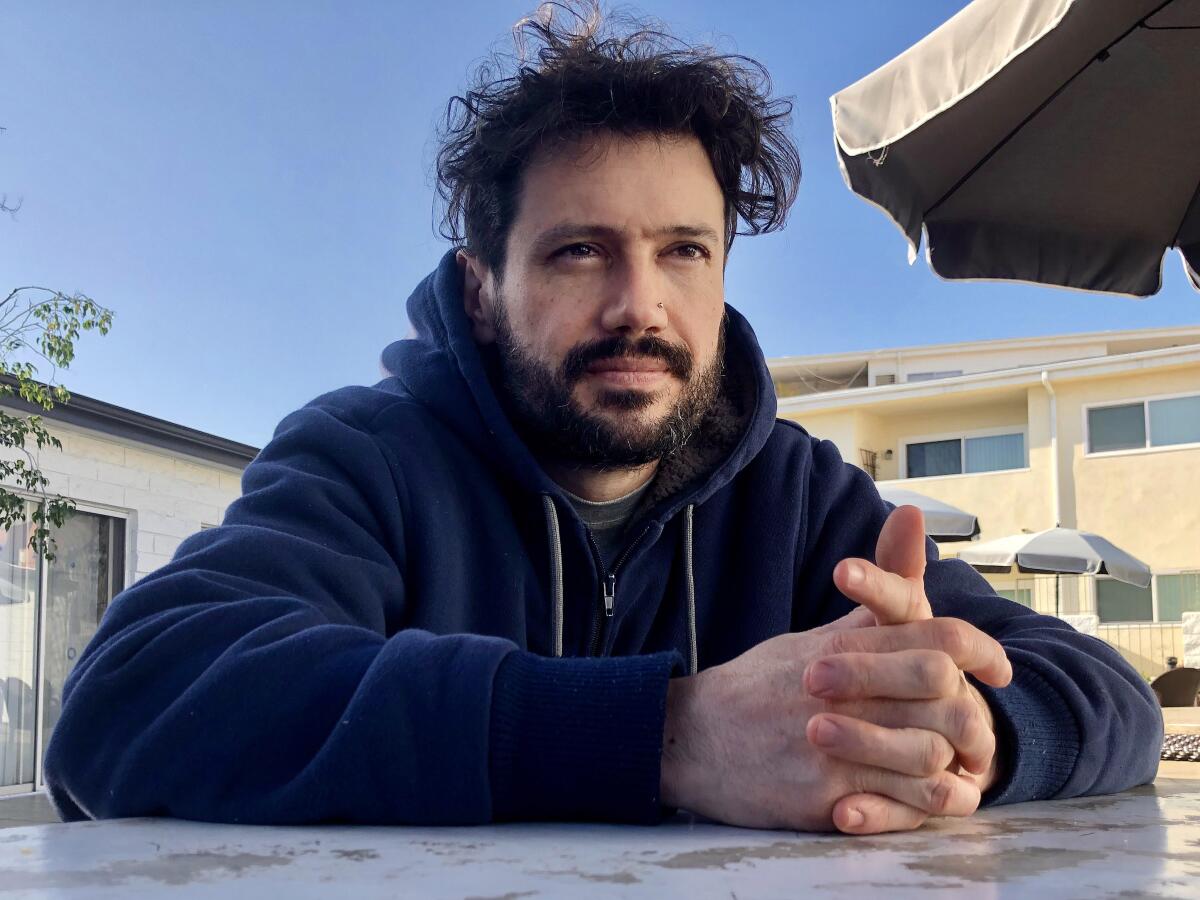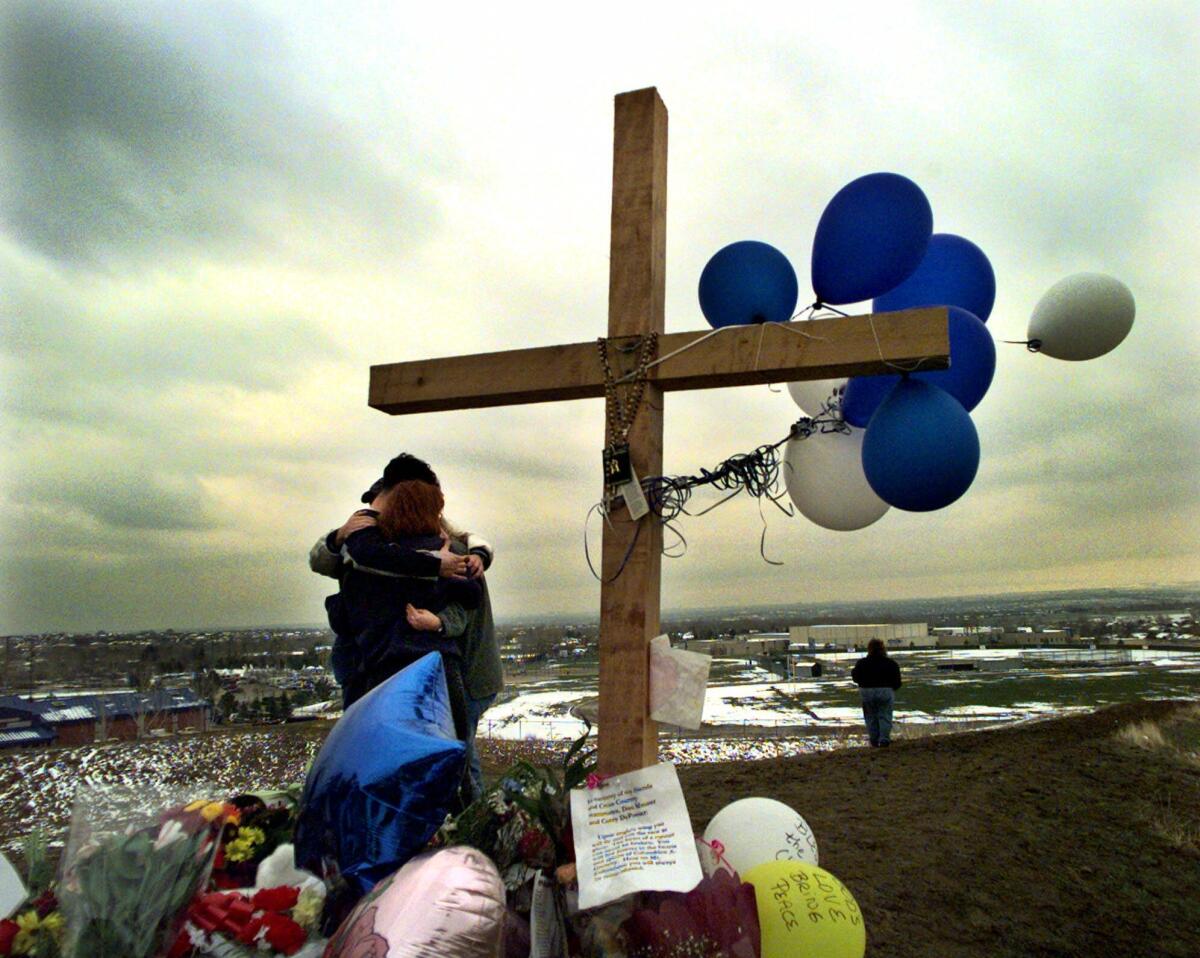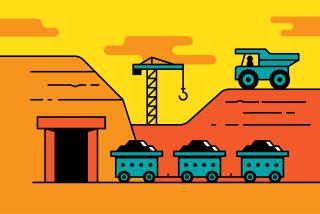Column: He’d like to get past the Columbine High shooting, but life has been a struggle

Former Columbine High School student Richard Castaldo did not look well when he arrived at the summit for victims of gun violence in downtown Los Angeles last September.
“I went up and hugged him and thought, ‘Oh my God, he’s just burning up,’” said Hollye Dexter, who was hosting the event as a member of Women Against Gun Violence.
Dexter and others in the gun control movement knew that Castaldo — shot eight times in the 1999 massacre in Colorado and paralyzed from the waist down — was losing his apartment in Los Angeles. They had urged him to attend the event to try to get some help. But when Dexter and others saw Castaldo that day, they realized he was too sick to be there, so they called 911, and he was whisked off to the hospital.
Five months later, Castaldo is recovering in a convalescent home in West L.A. What turned out to be a raging infection has been treated and he’ll be ready for discharge soon, but he’s lost his apartment and has nowhere to go.
“I’m still trying to figure that out,” Castaldo told me. “I’ve had friends offer places, but I need something wheelchair accessible and that’s not always the easiest thing.”
Dexter is one of a handful of women who have looked after Castaldo, visiting him in the hospital and the convalescent home over the last five months. They bring him food or take him out for meals, and they work the phones trying to find a place for him to live.
When the women reached out to me about his current plight, they warned that Castaldo guards his privacy. He doesn’t want to always have to be that guy — the guy forever identified by what happened on the worst day of his life. He wants to be Richard Castaldo, regular guy, with hopes and fears and a desire to look forward rather than back.
“I guess what I mean is, I know, obviously, that there’s no way not to mention it,” he told me. “But it’s all anyone seems to want to focus on all the time, which gets redundant.”
For the most part, during the course of two visits, we didn’t talk much about that day. But as Castaldo said, there’s no way not to mention it.

It’s been 21 years since two Columbine students shot and killed 12 classmates and one teacher in what at the time was the largest mass murder at a school in the United States. Castaldo was one of the first targets that day in April of 1999. He was having lunch with a female friend on campus when the shooting began.
His friend was killed. A bullet severed Castaldo’s spine. He was 17 at the time, and was paralyzed from the waist down. He is now 38 and has been in a wheelchair ever since.
Columbine was not the first school shooting. But it provided horrifying proof that there are no safe places, that firearms are everywhere, that we can’t protect our children, let alone anyone else.
It should have been an awakening that demanded action; instead it was the beginning of legislative paralysis on gun control and a gradual numbing of our outrage. So many school shootings have followed, we’re less shocked each time. The fatalities are counted, righteous cries for reforms trail off, we move on.
It’s not that way for the wounded survivors, or for their loved ones. They have scars: physical, mental, or both. The daily reminders, especially for those permanently disabled, have no expiration date.
“Over a hundred thousand people are shot and wounded every year in the U.S.,” said Dexter, whose own brother survived a gunshot wound to the head as a young boy. “I think there should be a benefit for every one of them. What I keep saying is that we have a war on our own streets.”
Castaldo shares a room with two other patients at the convalescent home. There is virtually no privacy. On the wall at the foot of his bed is an image of the Statue of Liberty with a red, white and blue school backpack. Lady Liberty is wearing a bullet-proof vest.
The day I met him, he held his head in his hands, rubbed his weary eyes, and took his time answering questions. He’s a handsome young guy with spools of dark hair, and there is something compelling in his eyes — an arresting blend of anger, independence, humility. He wants no one’s pity.
Dexter noticed that he was struggling with his wheelchair.
“One of the wheels is jacked up,” Castaldo said, making it harder for him to maneuver around the convalescent home, where his neighbors include amputees, elderly patients with cognitive loss and people learning to walk again after traumatic injuries.
Castaldo was distressed about a call from his mother, in Colorado, who had seen a story that suggested he would soon be homeless. He didn’t want to talk about that call, but made clear that relations with his relatives have been strained at times.
His mother, Connie Michalik, asked me to call her when she heard I was working on a story. When I did, she told me she sometimes cries at night, worrying about her son. He is sweet and good-hearted, she said, and in her opinion he has been taken advantage of by people he has befriended and sometimes sheltered while living in Los Angeles.
Michalik said a trust was established with money from donations and settlements after the Columbine shooting. She said several properties were purchased with the money, and the plan was to generate enough rental income to pay her son’s living expenses.
But two of the properties went into foreclosure, and the plan didn’t work out. Ultimately, Castaldo also lost the condo he was living in after moving to Los Angeles more than a decade ago. He then moved into a series of apartments, but lost those, too, and then got sick.
Michalik said she has helped pay her son’s bills for years, and offered Castaldo a home she owns in Nevada. But she wants for him to move in with family in San Diego, where he spent his early years, and where relatives will be available to look after him.
“I want him to come home,” Michalik said. “I need him to come home. I don’t want him to be in L.A. by himself anymore.”
I told Castaldo what his mother had said. He listened, head down as he thought things over. When he lifted his eyes, he said:
“That’s not home to me.”
He thought some more and said:
“I don’t want to be checked up on.”
Castaldo wants to be, needs to be, independent.
He wants to be 38, not 17.
Coming to Los Angeles was a way to start anew, he said. He was interested in music and video and went to school to become a sound engineer. He’d like to finally find steady work in that industry, get his own place again, pay his bills. He’s done open-mic comedy a few times. People have recommended he write a book, but he’s not so sure about revisiting the past.
Few people know it, and fewer still voted for him, but Castaldo ran for Congress in 2010, representing the Peace and Freedom Party (Henry Waxman was the victor in a landslide). He is now rooting for Bernie Sanders to be president, because he’ll take on Wall Street and fix the healthcare system, as Castaldo sees it.
Castaldo met Sanders at a campaign rally in California and is hoping to get out of the convalescent home in time to go to Nevada for the primary there, possibly with his fellow activist and friend Carlos Marroquin, who runs a local Bernie Brigade.
Marroquin told me he met Castaldo “in the days of Occupy, when [he was losing his condo] and we tried to help him.” Marroquin said Castaldo jumped into the fight with gusto. “Every time we tried to help someone else save their house, he would show up. We want him with us when we go out there. He inspires other people.”
Dexter told me that Castaldo began showing up at Women Against Gun Violence events a couple of years ago but didn’t want to be identified as “the Columbine survivor.” He was there, passionate but low key, lending his support.
Richard’s Crew, as Dexter calls the cadre of women, are returning the favor now. The crew includes Lorraine Morland, a gun violence survivor herself. Karen Goss, a counselor at Valley Beth Shalom. Shanna Caputo, a Las Vegas shooting survivor. And Deborah Gitell, a former neighbor of Castaldo’s who told the other women about him.
A local lawyer, Stuart Zimring, is working pro bono to sort through the details of Castaldo’s trust and see if he can get Social Security disability benefits, which had been denied because Castaldo had assets. Meanwhile, the social worker at Castaldo’s convalescent home is trying to find a placement for him, and I spoke to an executive at the St. Joseph Center, which has agreed to try to help.
Despite the uncertainty of where he’ll end up, Castaldo didn’t seem to be despairing. He’s gotten through so much already; he’ll handle this.
“I guess everyone wonders why Columbine happened and I don’t know, frankly. I think America is part of the problem. The American culture is so violent,” Castaldo told me.
“I think when Trump said he could shoot someone on Fifth Avenue and not lose any supporters, I think that right there capsulizes everything that’s wrong with America to me. I think that’s the bottom-line sickness of America right there.”
When I visited him the next day, he added one thought to that sentiment.
“As if shooting someone is some kind of joke,” he said.
More to Read
Sign up for Essential California
The most important California stories and recommendations in your inbox every morning.
You may occasionally receive promotional content from the Los Angeles Times.











